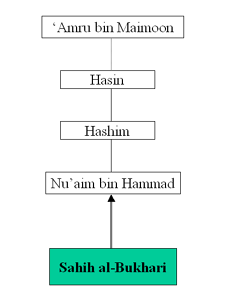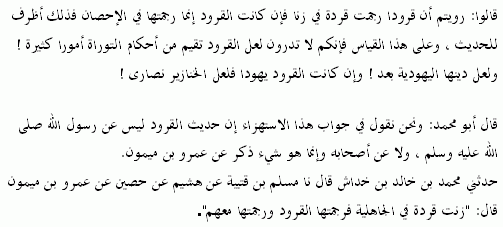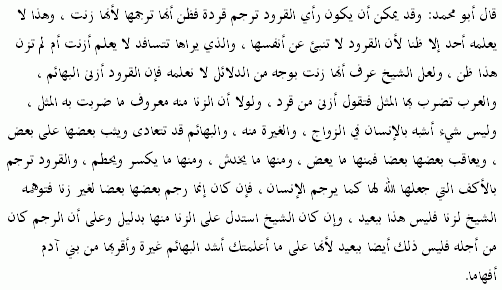An amusing little polemic regarding a hadith that is recorded in Sahih al-Bukhari has recently surfaced and is being circulated by some apostates from Islam. Naturally, the Christian missionaries too had decided to jump on the bandwagon of smearing Islam through a misinterpretation of this hadith as well.
The hadith is recorded as follows :
Volume 5, Book 58, Number 188 :
Narrated ‘Amru bin Maimun : “During the pre-lslamic period of ignorance I saw a she-monkey surrounded by a number of monkeys. They were all stoning it, because it had committed illegal sexual intercourse. I too, stoned it along with them.”
The basic premise of their “charge” is that the Prophet(P) had ordered the stoning of a she-monkey and that lapidation for zina (fornication) is extended to animals as well.
[toc]
Back to Basics : The Issue of Isnad and Matn
The full citation of the hadith as recorded by al-Bukhari is as follows :

On closer scrutiny of the above-recorded hadith, anyone proficient in the sciences of the Hadith (ulum al-hadith) would immediately see the fallacy of such a claim when the matn (text) and isnad (chain of transmission) of the hadith is studied.
Firstly, the person who uttered the above words was not the Prophet Muhammad(P) himself, but by one of his Companions by name of ‘Amru bin Maimun(R). The following is the chain of transmission for this hadith :

The hadith is categorized as mauquf (lit. “stopped”), meaning that it is a saying traced to that of a Companion(R). Therefore, since it is clear that this hadith is not a saying of the Prophet(P), much less ascribed to him, it cannot be a basis for a ruling in Islam.
Secondly, the key phrase in the above hadith is “During the pre-Islamic period of ignorance”, which the critics had obviously overlooked. While we concede that above hadith is indeed accepted as authentic, we would also argue that according to the principles of criticism of the hadith, the matn of the hadith above would be rejected even if it had been ascribed to the Prophet(P). ‘Abdur Rahman I. Doi has outlined this principle by stating that :
As far as the matn is concerned, the following principles of criticism of the Hadith are laid down :
(1) The Hadith should not be contrary to the text or the teaching of the Qur’an or the accepted basic principles of Islam.
(2) The Hadith should not be against the dictates of reason or laws of nature and common experience.
(3) The Hadith should not be contrary to the Traditions which have already been accepted by authorities as reliable and authentic by applying all principles.
(4) The Hadith which sings the praises and excellence of any tribe, place or persons should be generally rejected
(5) The Hadith that contains the dates and minute details of the future events should be rejected.
(6) The Hadith that contains some remarks of the Prophet which are not in keeping with the Islamic belief of Prophethood and the position of the Holy Prophet or such expressions as may not be suitable to him should be rejected.‘Abdur Rahman I. Doi, Introduction to the Hadith (A.S. Nordeen, 2001), p. 15
Ibn Hajar
Interestingly, Ibn Hajar in his Fath al-Bari had discussed at length the exegesis of the above hadith. He quotes from Ibn Abd al-Barr as follows :

Ibn Abd al-Barr has denounced this report of ‘Amru Ibn Maimun and said : “It includes attributing adultery to a creature not assigned (with distinction between lawful and unlawful) and implementation of legal punishment on animals. This is denounced before scholars”.Ali Ibn Hajar al-Asqalani, Fath al-Bari
Then Ibn Hajar responds to the above argument of Ibn Abd al-Barr :

…I answer that the event being similar to that of adultery and stoning does not necessitate that it is really adultery or legal punishment. It is called so because it is similar to it, so it does not necessitate assignment of animals (with a distinction between lawful and unlawful).
In other words, even if we assume for the sake of the argument that the claims of the apostates are true and the above hadith is indeed ascribed to the Prophet(P) , the critics will still not be able to make the charge that the Prophet(P) had ordered the stoning of a she-monkey.
Ibn Qutaiba
Ibn Qutaiba makes further commentary on the above hadith as follows :


They said : You narrated that some monkeys stoned a she-monkey for fornication. If the monkeys stoned her while she is married, the hadith would be funnier. According to this example, you cannot be sure for perhaps monkeys implement many rulings of the Torah ! Or probably they embrace Judaism ! So, if the monkeys are Jews, then perhaps the pigs are Christians !
Abu Muhammad [‘Abdullah Ibn Qutaiba, d. 276 A.H.] said : In response to this sneer we state that the narrative of monkeys is neither on the authority of Allah’s Messenger (peace be upon him) nor any of his Companions ; it is merely something mentioned by ‘Amr Ibn Maimon. Muhammad Ibn Khalid Ibn Khadash told me that Muslim Ibn Qutaiba said on the authority of Hashim on the authority of Hasin on the authority of ‘Amr Ibn Maimon that he said, “A she-monkey had committed fornication during Jahiliyyah, so the monkeys stoned her and I stoned her with them”.
Abu Muhammad said : He could have seen the monkeys stoning a she-monkey, so he imagined that they were stoning her because she committed fornication, this cannot be known except by supposition because monkeys do not express themselves and the one who sees them gathering cannot tell whether they fornicate or not. This is a supposition. Perhaps, the old man knew she had fornicated for some reason we do not know for monkeys are the most fornicating animals. Arabs refer to them as examples of (exaggerated) fornication and say : “fornicating more than a monkey”. Unless fornication is common among them, they would not be used as an example. There is none closer to man in marriage and jealousy than them. The animals get hostile with one another, jump over and punish one another. Some bite, some scratch, some break and some smash. Monkeys stone with their hands whom Allah created as man stones. If they stoned one another for a cause rather than fornication and the old man thought it is fornication, it would not be far. If the old man knew about fornication by some evidence and that stoning was for it, it would not be far either because — as I have informed you — they are the most jealous among animals and the closest to man regarding understanding.
The points we have made should make it clear that ‘Amru bin Maimun was relating his thinking or perception prior to the advent of Islam — how he had foolishly believed that even monkeys had committed adultery ! It happened during a period whereby the pre-Islamic Arabs would indulge in the most detestable acts such as burying their daughters alive and doing the tawaf while they were naked.
Thus, this means that Islam has elevated the status of mankind by making them more rational and mindful of their actions, a conclusion that the haters and enemies of Islam would certainly not like to admit.
What About The Bible ?
If the above hadith is used to condemn Islam with regards to treatment towards animals, then the Bible has the following to say :
If a man has sexual relations with an animal, he must be put to death, and you must kill the animal. If a woman approaches an animal to have sexual relations with it, kill both the woman and the animal. They must be put to death ; their blood will be on their own heads.
Leviticus, 20:15 – 16
In other words, an animal that has committed its sin of adultery is liable to be punished for a “crime” it is unaware of in the first place, according to the Bible.
Conclusions
It is clear that where the hadith regarding the stoning of a she-monkey for adultery is concerned, it is simply a recollection of a Companion(R) of the Prophet(P) regarding this maltreatment of animals during the pre-Islamic period of jahiliyyah, which is in total contradiction to Islamic principles and norms. Thus, the claim that this hadith is the basis from which the lapidation for married adulterers in Islam came about is nothing more than a damp firecracker hurled by the haters and enemies of Islam. That their view of Islam had been tainted by deep ignorance, hatred, paranoia and xenophobia is no big secret, and this latest polemic is ipso facto a confirmation of their current condition.
And only God knows best. 


